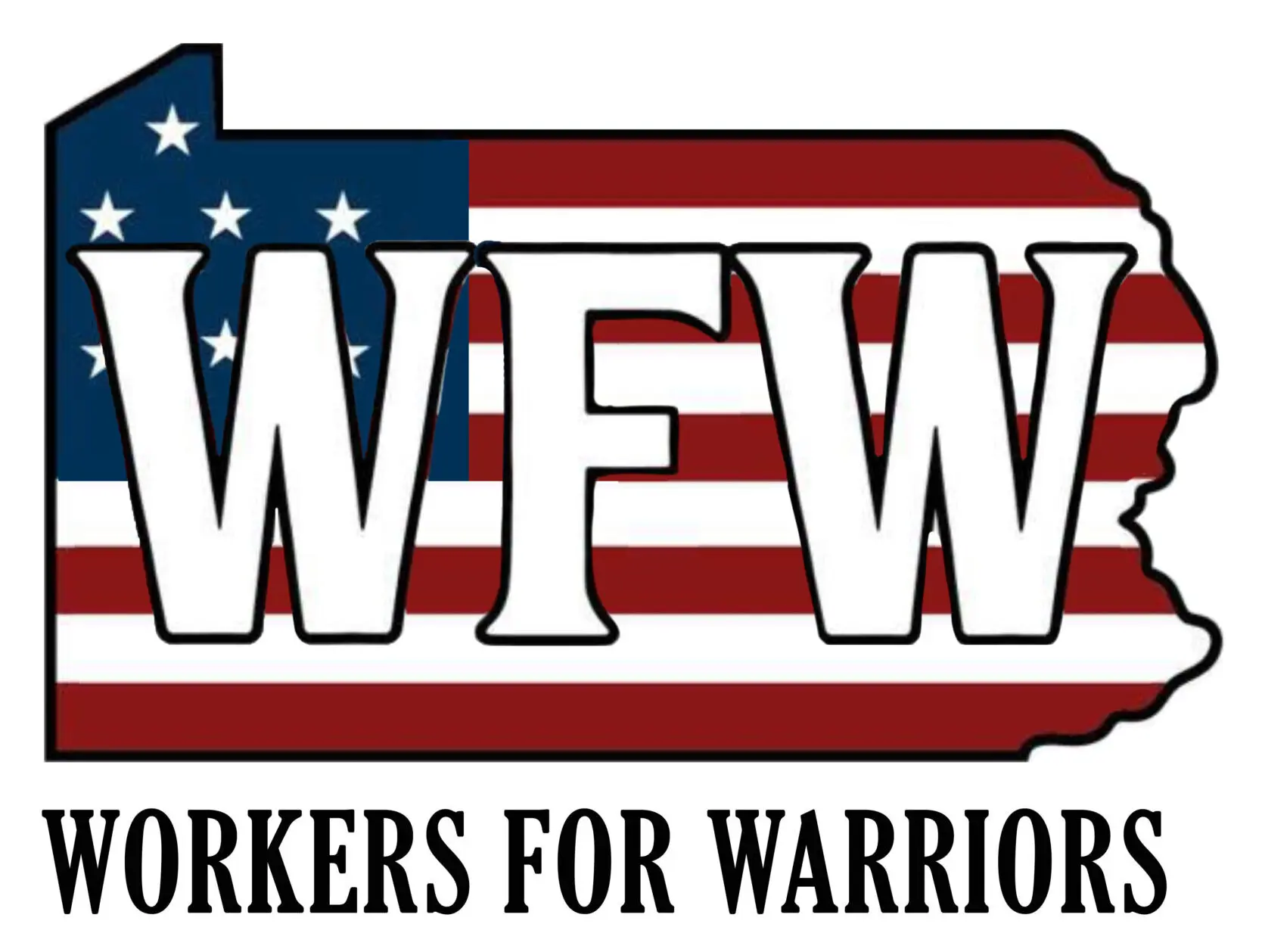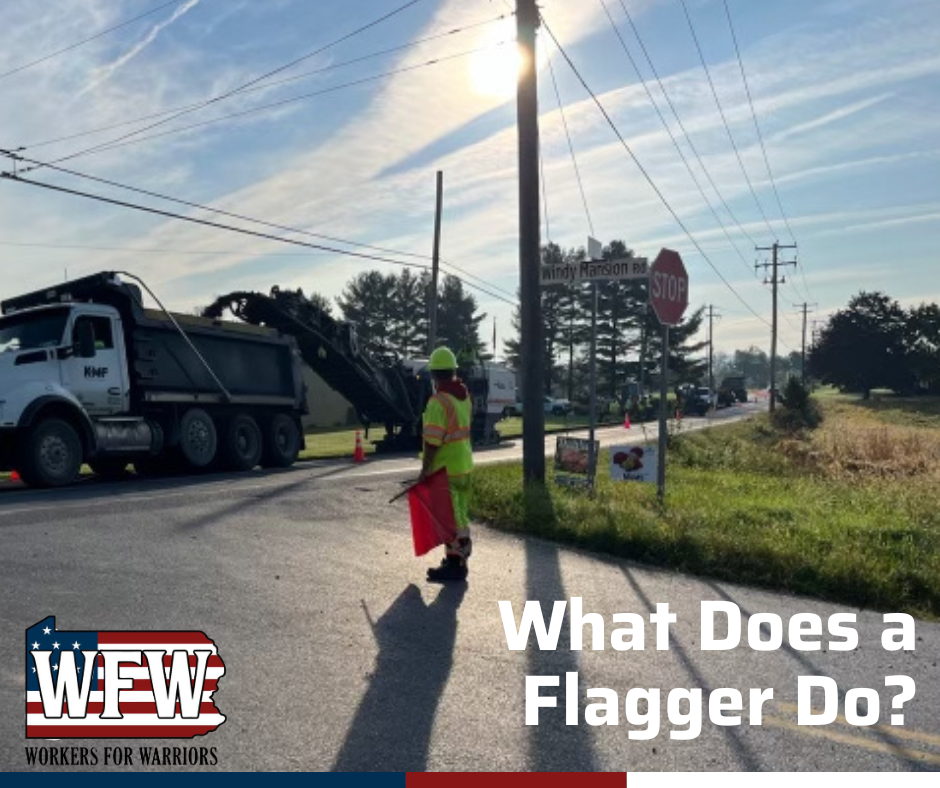What is a Flagger?
Traffic control flaggers are trained professionals who play a vital role in keeping our roads safe & directing traffic in work zones, construction sites, or areas with temporary road closures using hand signals, signs, and cones. This ensures a safe traffic flow for vehicles while keeping construction workers, pedestrians, and drivers safe from hazards within the zone. Certified Traffic control Flaggers must be attentive, follow strict safety protocols, and communicate effectively to prevent accidents and maintain smooth traffic movement.
Workers for Warriors understands the importance of veterans finding meaningful employment, and flagging is a great option for those looking to transition into the workforce.
The Duties of a Flagger
A traffic control flagger controls vehicle traffic flow around construction sites, parking lots, special events, etc. Their primary focuses include:
- Traffic Control: This is the heart of the flagger job. Flaggers use hand signals, stop signs, and slow paddles to direct vehicles through construction zones, ensuring a safe and smooth flow of traffic.
- Setting Up Work Zones: Flaggers play a crucial role in setting up the physical boundaries of the construction zone. They place traffic cones, barricades, and signs to warn drivers of upcoming hazards and guide them on the designated path.
- Communication: Flaggers are the eyes and ears of the work zone. They constantly communicate with drivers, providing clear instructions and directions. They also maintain communication with construction crews, alerting them of any potential safety hazards or traffic issues.
- Safety: A flagger’s main priority is safety. They are responsible for ensuring the safety of both construction workers and the motoring public. This involves being vigilant and watching out for any unsafe situations, such as speeding vehicles or pedestrians entering the work zone. In some cases, flaggers may also be responsible for reporting reckless drivers to the authorities.
- Record Keeping: Depending on the specific work zone, flaggers may be required to document traffic flow patterns or take down license plate numbers of vehicles that violate traffic laws.
- Pilot Car Drivers: In some instances, pilot cars are used to guide oversized or slow-moving vehicles safely through a work zone.
- Traffic Control Technician: These technicians are responsible for a wider range of duties compared to flaggers. They may assist with developing traffic control plans, setting up and maintaining more complex traffic control devices (like changeable message signs), conducting traffic studies, and ensuring compliance with traffic control regulations. In some cases, they may also be qualified to act as flaggers themselves.
Why Certified Traffic Control Flaggers Are Important?
Work zones can be dangerous for both workers and motorists. Without proper traffic control, the risk of collisions and injuries increases significantly. WFW Certified Flaggers help reduce these risks by providing clear guidance to drivers and maintaining an orderly flow of traffic. Their presence ensures that construction projects progress smoothly without unnecessary delays or safety incidents.

How to Become a Flagger? Qualifications and Certifications
To be successful as a traffic control flagger, you’ll need a combination of physical fitness, clear communication skills, the ability to work independently and as part of a team, and a strong sense of responsibility. Here are some additional requirements to consider:
- High School Diploma or GED: While some flagging positions may not require a formal diploma, having a high school diploma or GED demonstrates basic communication and comprehension skills.
- Complete a Flagger Training Program: Most states require flaggers to complete a certified flagger training program that covers traffic control procedures, hand signals, safety protocols, work zone setup, and emergency response. Workers for Warriors can help connect you with these programs.
- Valid Driver’s License: While not always mandatory, having a valid driver’s license demonstrates an understanding of traffic laws and road signs.
- Hearing and Vision Acuity: Flaggers need good hearing and vision to effectively communicate with drivers and perceive potential hazards in the work zone.
- Get Your Flagger Certification Card: Once certified, you can use this card to apply for flagging jobs. Certifications typically last 2 to 4 years before renewal is required.
- Stay Up to Date: Renew your certification before it expires by taking a refresher course.
Beyond these qualifications, a positive attitude, willingness to learn, and a commitment to safety are all valuable assets for any aspiring flagger.
Become A Traffic Flagger
Once certified, search for job openings on construction company websites, local job boards, or traffic management firms. Prepare your resume to highlight your flagger training, certifications, and any relevant experience. Submit your application online or in person, and be ready for an interview where you can showcase your communication skills and knowledge of safety protocols.
If you’re a veteran looking for a rewarding career path that offers the opportunity to work outdoors and make a real difference, then our flagging positions might be the perfect fit for you.




